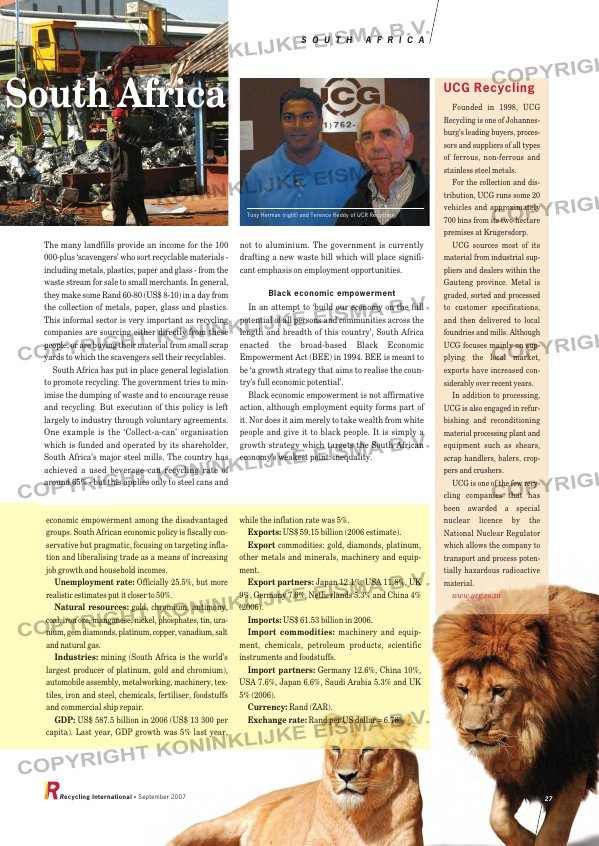Page 27 from: October 2007

The many landfills provide an income for the 100
000-plus ‘scavengers’ who sort recyclable materials –
including metals, plastics, paper and glass – from the
waste stream for sale to small merchants. In general,
they make some Rand 60-80 (US$ 8-10) in a day from
the collection of metals, paper, glass and plastics.
This informal sector is very important as recycling
companies are sourcing either directly from these
people, or are buying their material from small scrap
yards to which the scavengers sell their recyclables.
South Africa has put in place general legislation
to promote recycling. The government tries to min-
imise the dumping of waste and to encourage reuse
and recycling. But execution of this policy is left
largely to industry through voluntary agreements.
One example is the ‘Collect-a-can’ organisation
which is funded and operated by its shareholder,
South Africa’s major steel mills. The country has
achieved a used beverage can recycling rate of
around 65% – but this applies only to steel cans and
Recycling International • September 2007 27
not to aluminium. The government is currently
drafting a new waste bill which will place signifi-
cant emphasis on employment opportunities.
Black economic empowerment
In an attempt to ‘build our economy on the full
potential of all persons and communities across the
length and breadth of this country’, South Africa
enacted the broad-based Black Economic
Empowerment Act (BEE) in 1994. BEE is meant to
be ‘a growth strategy that aims to realise the coun-
try’s full economic potential’.
Black economic empowerment is not affirmative
action, although employment equity forms part of
it. Nor does it aim merely to take wealth from white
people and give it to black people. It is simply a
growth strategy which targets the South African
economy’s weakest point: inequality.
S O U T H A F R I C A
economic empowerment among the disadvantaged
groups. South African economic policy is fiscally con-
servative but pragmatic, focusing on targeting infla-
tion and liberalising trade as a means of increasing
job growth and household incomes.
Unemployment rate: Officially 25.5%, but more
realistic estimates put it closer to 50%.
Natural resources: gold, chromium, antimony,
coal, iron ore, manganese, nickel, phosphates, tin, ura-
nium, gem diamonds, platinum, copper, vanadium, salt
and natural gas.
Industries: mining (South Africa is the world’s
largest producer of platinum, gold and chromium),
automobile assembly, metalworking, machinery, tex-
tiles, iron and steel, chemicals, fertiliser, foodstuffs
and commercial ship repair.
GDP: US$ 587.5 billion in 2006 (US$ 13 300 per
capita). Last year, GDP growth was 5% last year,
while the inflation rate was 5%.
Exports: US$ 59.15 billion (2006 estimate).
Export commodities: gold, diamonds, platinum,
other metals and minerals, machinery and equip-
ment.
Export partners: Japan 12.1%, USA 11.8%, UK
9%, Germany 7.6%, Netherlands 5.3% and China 4%
(2006).
Imports: US$ 61.53 billion in 2006.
Import commodities: machinery and equip-
ment, chemicals, petroleum products, scientific
instruments and foodstuffs.
Import partners: Germany 12.6%, China 10%,
USA 7.6%, Japan 6.6%, Saudi Arabia 5.3% and UK
5% (2006).
Currency: Rand (ZAR).
Exchange rate: Rand per US dollar = 6.76.
n South Africa UCG RecyclingFounded in 1998, UCG
Recycling is one of Johannes –
burg’s leading buyers, proces-
sors and suppliers of all types
of ferrous, non-ferrous and
stainless steel metals.
For the collection and dis-
tribution, UCG runs some 20
vehicles and approximately
700 bins from its two-hectare
premises at Krugersdorp.
UCG sources most of its
material from industrial sup-
pliers and dealers within the
Gauteng province. Metal is
graded, sorted and processed
to customer specifications,
and then delivered to local
foundries and mills. Although
UCG focuses mainly on sup-
plying the local market,
exports have increased con-
siderably over recent years.
In addition to processing,
UCG is also engaged in refur-
bishing and reconditioning
material processing plant and
equipment such as shears,
scrap handlers, balers, crop-
pers and crushers.
UCG is one of the few recy-
cling companies that has
been awarded a special
nuclear licence by the
National Nuclear Regulator
which allows the company to
transport and process poten-
tially hazardous radioactive
material.
www.ucg.co.za
Tony Herman (right) and Terence Reddy of UCR Recycling.
RI_038 South Africa_ingekort:Opmaak 1 07-09-2007 15:36 Pagina 27



